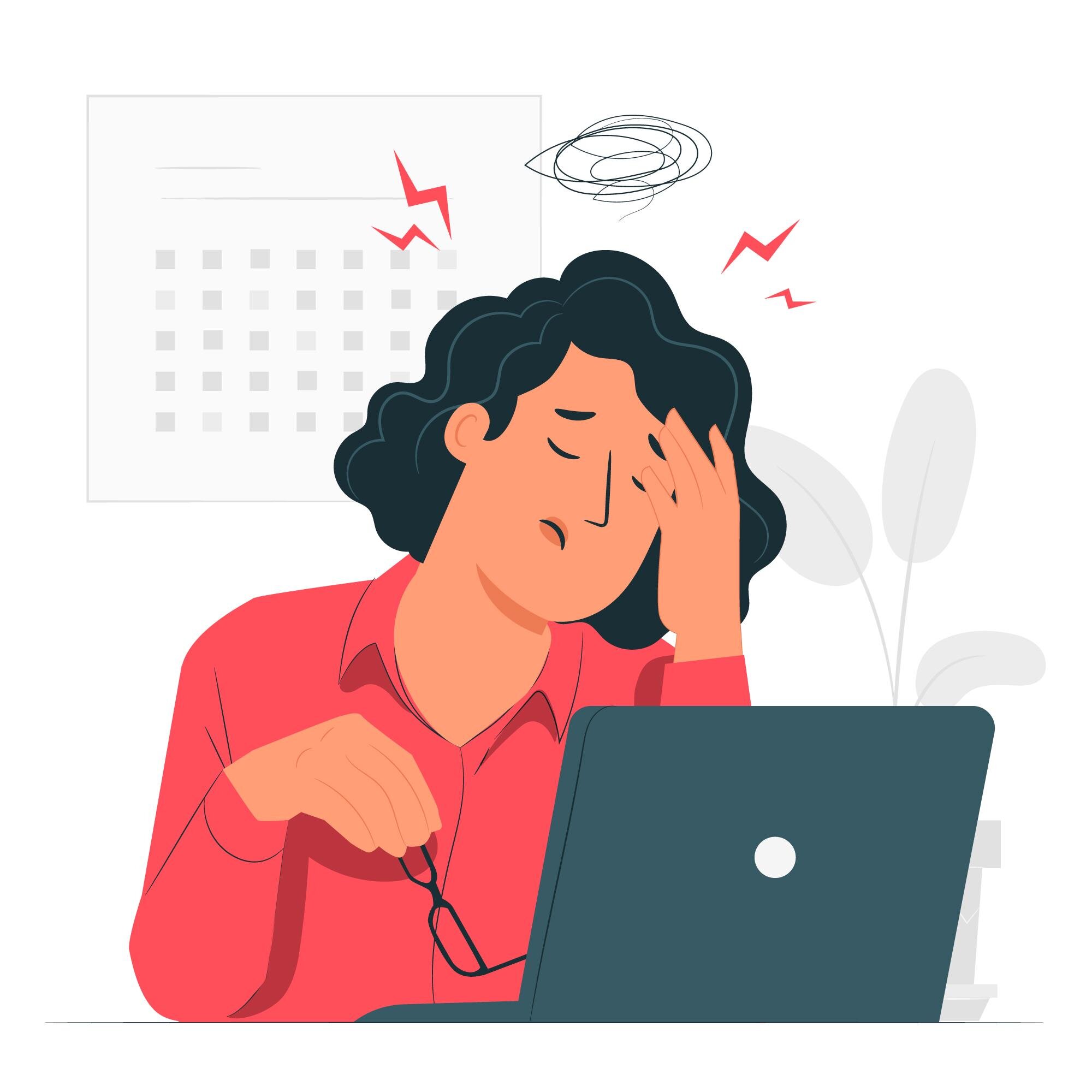How to Defeat Workplace Anxiety
We all encounter the everyday pressure that accompanies our job. Most of us at some point wonder how much of this stress is normal, and how we can defeat the resulting workplace anxiety and become a more productive and happy version of ourselves.
We know reducing workplace anxiety and stress can have far-reaching benefits like boosting our performance, concentration, and also our sense of wellbeing in our day-to-day lives. The good news is there are simple steps that you can take to tackle the struggles that come with increased stress! Before we dive in it’s worth understanding the broader consequences that can result from high levels of stress and workplace anxiety.
Workplace Anxiety Affects More Than Your Work
Work stress is a common symptom in today’s fast-paced world, often throwing us off balance and creating broader workplace anxiety. That’s normal when we have a strong commitment to a high level of output and want to show up as our best selves in our job. Often stress can be a positive factor, pushing a person to achieve. At times though, these high levels of stress have a negative effect on how you perform at work, and can have a spillover effect in other areas of your personal life.
A 2006 survey by the Anxiety Disorders Association of America (ADAA) found that 56 percent of people who have stress and anxiety say it interferes with their work. The respondents noted that this affected everything from their workplace performance to the relationships they have with co-workers, and that it even negatively affected their quality of work. It was also reported in the survey that seven in 10 people found that workplace anxiety stretched into their personal relationships, in particular affecting their relationship with their spouse.
A separate study by the BioMed Research Institute found that––in addition to work-related impacts such as increased sick leave and reduced participation––workplace stress can, “increase an individual’s vulnerability to more serious mental health.” Other consequences of high levels of workplace anxiety may include sleep issues, physical manifestations such as headaches or stomach issues, and in extreme situations minor panic attacks. All of this data points to the critical importance of finding methods of defeating stress.
How Do I Stop Workplace Anxiety?
First off, it is important to create a playbook of strategies to employ when you find yourself dealing with high levels of workplace anxiety. It is impossible to know when an excessively stressful situation may present itself, so preparing in advance can help you better deal with any anxiety as it arises. Kathleen Smith, Ph.D., LPC, advises that a key factor to success is building a wellness plan to combat stress. Below are five key themes to help you create your own wellness plan for combating workplace anxiety.
1.Talk It Out
It cannot be understated how effective it is to simply talk through your feelings with another person. Finding a good friend or partner to share your feelings with is a good step in the right direction. Confiding in a trusted coworker may also prove helpful, as it can help create a greater feeling of understanding and connection with someone who is in a similar role as you.
It is also important to let your manager or boss know when you find yourself stretched beyond your limits. Having an open and honest conversation about your workplace anxiety levels is a great step towards managing stress. Your manager can help provide alternatives to current expectations, and lower your levels of anxiety. If there is a particular person who you find is at the center of your stress, have a conversation about how you are feeling and what you need. The act of verbalizing what’s specifically causing you stress may light a path to what you need to do to resolve the issue.
2. Get Moving
It’s widely known that exercise is key in reducing stress. The science shows that exercise pumps up your endorphins and reduces levels of stress hormones like adrenaline and cortisol. The American Heart Association recommends 150 minutes per week of moderate-intensity aerobic activity or 75 minutes per week of vigorous aerobic activity for adults. But don’t let these numbers scare you!
The best way to get active is to find an activity you enjoy that gets your body moving and allows you to get out of your head. Walking, yoga, and biking are all simple ways to incorporate movement into your daily routine. Return to a sport that you loved in your youth, even if it's hitting tennis balls against a wall or throwing a football with your kid or roommate. Even if you can’t get a workout in, take ten minutes to stretch out parts of your body that feel tense or sore. Any of these activities will provide the stress-reducing benefits of movement and help lower your general workplace anxiety. You may find that focusing on something that you do just for you can provide a specific kind of balance to the demands of a busy career.
3. Be Mindful
At times stress is a result of falling behind in what needs to get done. For many of us, finding a distraction or becoming preoccupied with unimportant things can cause us to fall behind on our to-do list. Research has shown that almost half of our time is spent thinking about something rather than actually working on it! The Mayo Clinic found that giving in to distraction repeatedly can be a major source of stress, and their research shows that practicing mindfulness can create a path forward. Meditation has moved into the mainstream in recent years, and is an excellent way to train your brain to become more mindful. Apps like Calm and Headspace can provide guided coaching in the area of mediation.
Maintaining a focused awareness of your actions and surroundings is another way to remain mindful and focused on the task at hand. Simple acts like deep breathing and stretching can bring you into the moment and act as meaningful ways to reduce stress. Use these mindful techniques as the need arises, but also consider starting or ending your day with a brief meditation to clear your head.
4. Take a Facts First Approach
Emotions can become overwhelming when your levels of workplace anxiety are high, so it is important to spend some time thinking through the facts of the current situation. Stay in control of the conversation you have with yourself, and separate fears from reality. This is done by focusing on what you know to be true (you’ve got to give a presentation on Wednesday, your flight leaves at 11 am, mid-year reviews will be shared next week) and not what you fear may happen (your audience might not like your content, traffic will be bad and you will miss your flight, you merit-based raise won’t be quite what you expect.) Use your energy to determine what the facts are rather than what might happen in any given scenario. And then focus on the tangible next steps you can check off your list.
Alternatively, you can also benefit from shifting how you respond to the facts at hand through a technique known as reframing. Reframing allows you to see the problem in a different light, to identify new benefits or solutions by shifting the way you look at a problem. By doing this, we can change the way we perceive our stressors and view them in a more positive way.
5. Know Your Limits
Ask for help, set reasonable deadlines, learn to say no, and take time when you need it! Knowing your limits is a time-tested way to build confidence in yourself––that you can handle anything that comes your way. Is a particular project or task the source of your tension? Don’t be afraid to ask for help. The act of talking through ideas or next steps might remove the block that is causing your workplace anxiety.
Do you overcommit to timelines or deliverables? Set reasonable deadlines and learn when to say no to protect your own time. Is it difficult to find a minute to yourself to assess what you really need? If you need a little time to reset, put those well-earned vacation days to use. Traveling can do wonders in resetting stress levels, though that may not always be feasible. A day off to indulge in whatever form of self-care you find helpful––or even just a few hours on a Friday afternoon––might just be the remedy needed to reduce workplace anxiety. Take the time to ask yourself where you have been pushing too far and where you can set specific limits in your work and personal life.
A Final Thought
Stress can seem all-consuming at times, but it’s critical to remember that you are in control of how you respond to a given situation. By utilizing these key techniques to defeat workplace anxiety, you can manage the things that seem daunting and overwhelming and hopefully find more joy in your career!
Did you find this article helpful?
We have newsletters designed specifically for Executive Assistants and Business Leaders! Sign up to receive our bi-weekly newsletters here and you’ll receive more science-backed productivity tips and tricks directly to your inbox.
33Vincent has many other resources to help you maximize your time and communication with your executive assistant.


